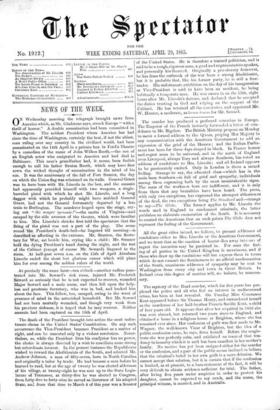The death of the President brought into action the most
unfor- tunate clause in the United States' Constitution. On any such occurrence the Vice-President becomes President as a matter of right, and can be unseated only by a violent revolution. Never- theless, as, while the President lives his coadjutor has no power, the choice is always directed by a wish to conciliate some strong but subordinate interest. In the present instance the Republicans wished to reward the Abolitionists of the South, and selected Mr. Andrew Johnson, a man of fifty-seven, born in North Carolina and originally a tailor by trade. He had become a man before he learned to read, but at the age of twenty he was elected alderman of his village, at twenty-eight he was sent up to the State Legis- lature of Tennessee, at thirty-five he was elected to Congress, from forty-five to forty-nine he served as Governor of his adopted State, an from that time to March 4 of this year was a Senator of the United States. He is therefore a trained politician, and is said to be a rough,vigorous man, a good and argumentative speaker, and personally kindhearted. Originally a pro-slavery democrat, he has from the outbreak of the war been a strong Abolitionist, but it is probable that, like his former party, he is still a free- trader. His unfortunate exhibition on the day of his inauguration as Vice-President is said to have been an accident, be being habitually a temperate man. Ile was sworn in on the 15th, eight hours after Mr. Lincoln's decease, and declared that he accepted the duties trusting in God and relying on the support of the Cabinet. He has retained all the secretaries, and appointed Mr. W. Hunter, a moderate, as locum tenens for Mr. Seward.






























